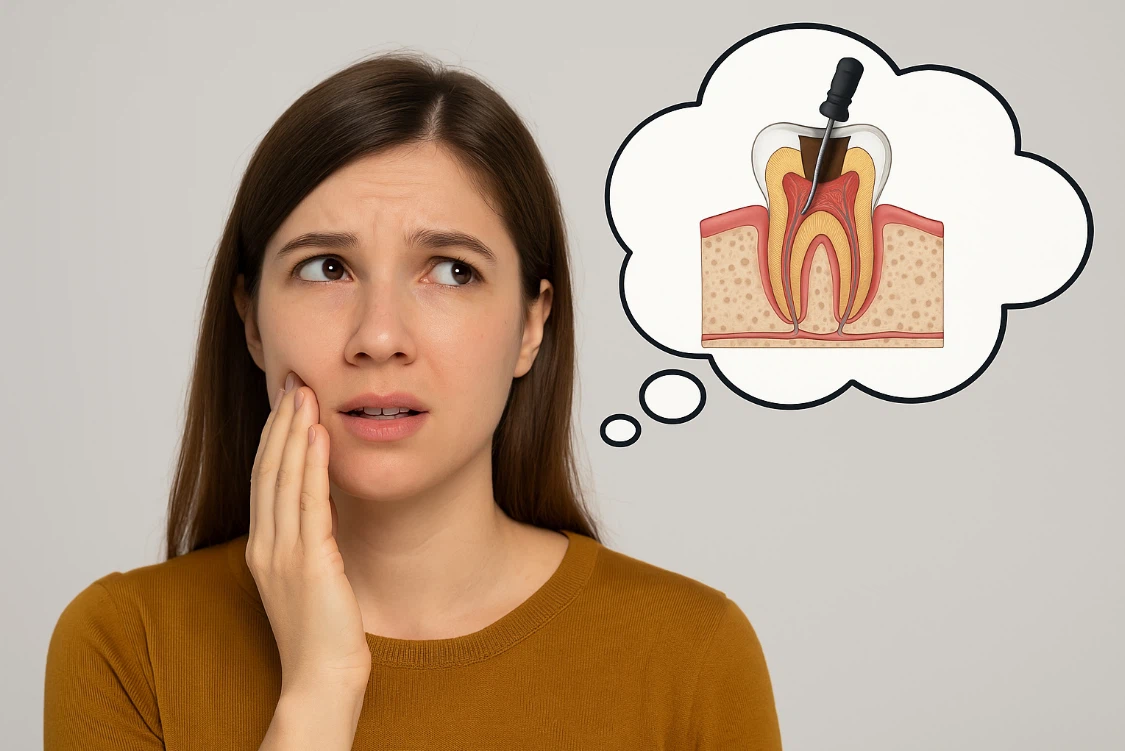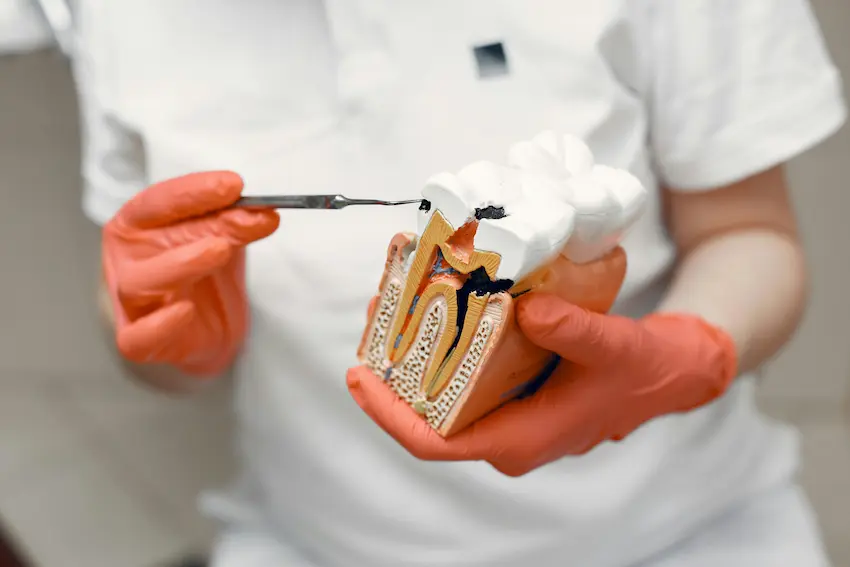🦷 Does a Root Canal Hurt?

For the majority of people, the words “root canal” evoke memories of a horrifyingly excruciating and traumatising dental treatment. Contrary to it, with the help of the continuous improvements in dental technology, new ways of applying anesthesia, and developed methods, the root canal has become a routine, comfortable, and highly effective one. Actually, the aim of endodontic treatment, more specifically root canal therapy, is to eliminate the severe pain a person experiences as a result of the inflammation or infection that the pulp of the tooth has caused, and not to add more pain.
Nonetheless, be it the symptoms or the questions regarding the extent of the pain before, during, and after the procedure, it’s quite common to experience anxiety. The utter non-existence of facts and instead, the providing of myths on the level of the pain experienced through the various stages of the process are meant to be unveiled through this reminder.
Should Root Canals Hurt?
The primary answer is no—a properly executed root canal should not hurt throughout the process. Before starting the procedure, the dentist will utilize local anesthesia to make sure that the tooth and the surrounding regions are fully anesthetized and numb. This is the best way of rendering the procedure painless, aside from being like the filling of the tooth.
But remember that there are several common sensations:
- Pressure or vibration from dental instruments
- Slight tugging as canals are cleaned
- Mild discomfort if infection is severe (but manageable)
Normally, when there’s already swelling or pressure in the case of an infected tooth, pre-treatment discomfort may still be present and the anesthesia may not be effective. Still, that should only last during the initial stages of root canal treatment because this process is quite liberating most of the time.
How Bad Does a Root Canal Hurt (1–10)?
The majority of the patients rate the operation of the root canal as 1 or 2 on a pain scale, which means it is absolutely acceptable, or in other words, surprisingly easy. This is quite a shock to people who have come in expecting a story that is not least 10.
Where does the pain really happen?
- Before the root canal: Infected or abscessed teeth can cause intense pain (7-10), particularly when biting, eating hot or cold foods, or when lying down.
- After the procedure, Mild to moderate discomfort, usually around a 3 or 4, may last for several days.
The post-treatment soreness is the same as that of a dental filling or extraction and it’s also not as bad as infection pain. It is just the process of healing, that is all, the body’s answer to the treatment it got.
Does a Root Canal Hurt After?
Yes, some level of post-procedure pain or tenderness is normal. When the anesthesia effect wears off, you could face the following problems:
- Discomfort at the treated tooth or in the area of teeth
- Sharp biting and chewing pain, especially at the tooth that was swollen.
- Limited swelling or increased sensitivity for 2–5 days
The reason is that when you take out the infected tooth nerve, the surrounding tissues as well as the ligaments, are still going through the healing process. The majority of this pain can be controlled through the intake of such common pain relievers as ibuprofen or paracetamol, and eventually, most of it goes away with time.
When a person is having pain after 5 to 7 days, it could be indicative of:
- Remaining infection
- Bite misalignment
- A cracked root or restoration issue
Call your dentist for a check-up if this is so.
How Long Does a Root Canal Hurt?
The time a root canal is painful relies on multiple factors:
- The extent of the infection
- The tooth’s position (molars bear more weight)
- Each person’s natural capacity to heal
- Whether the treatment was completed in one appointment or two
Normally:
- A slight ache will go away within 1 to 3 days
- It will take 7 days until you can chew normally again
- Exceptionally, the discomfort may last over 14 days if the bite is be rectified
If swelling or an infection does not go down, your dentist might prescribe you antibiotics, also he/she will clarify if it’s the right case for a bite correction or a more severe treatment.
Why Is My Root Canal Tooth Hurting After Years?
If your root canal is still hurting many years after the procedure, it is not normal and you should absolutely see a dentist about it. The possible reasons include:
- A root canal that did not succeed and is now infected
- A broken root or crown
- An additional canal, other than the main one, that was not cleaned during the first treatment
- An infection of the adjacent gums or bone
The best treatment as a choice is usually the removal of the source of infection or an apicoectomy. These are the two most common procedures a dentist would use to try and cure the tooth.
Why Is My Root Canal Tooth Hurting After Months?
No patient should be experiencing pain resulting from a root canal several months down the line; it could mean that the person has a chronic infection if nothing has been done to change the pain situation. The possibility of a loose or damaged crown and even nerve irritation of the treated area cannot be overlooked.
Here are some of the symptoms to look out for:
- Discomfort when biting or placing a finger on the area
- Swelling of the gums or a small pimple (abscess) on the gum
- Pain that comes and goes
The dental professional will most likely suggest an X-ray of the abscess if present.
The sooner the case is handled, the greater the chances are for the life of the tooth to be saved.
Conclusion:
Root canal treatment has evolved greatly to the point where there are no more daunting experiences faced. This is not to say that some pain is not to be expected; it is a procedure that is mostly without pain and gives long-term relief from the excruciating toothache. Do not hesitate to contact your dentist for a consultation to rule out the chances of problems and protect your smile if you find yourself experiencing pain after a few weeks, months, or even years.
Frequently Asked Questions About Root Canal Pain
Present-day root canals are performed with local anesthesia and, in most situations, do not cause any pain. Patients often feel that they are the same as getting a dental filling.
Usually, a root canal is not a painful process and only some discomfort is felt, which is usually a pain scale score of 1 to 2 out of 10. The pain leading up to the treatment—caused by infection—is usually far worse.
Yes, you will experience a little to moderate soreness for a few days after the procedure. The swelling and the body’s healing process are the causes of this discomfort.
If you still have pain after a root canal treatment, it may be normal, but if the pain is constant or even getting worse, it could be a case of incomplete cleaning, re-infection, or a broken tooth. A return visit and an X-ray exam can help in the identification of the cause.
In most cases, the soreness will only last one to three days after the treatment, while the sensitivity to bite may take a week before it is fully recovered. If pain is still present after 7–10 days, a check-up from your dentist is necessary.
It’s normal for you to feel a little discomfort or pain the following day, particularly when biting or touching the area. If this pain does not go away on its own, use medication for relief and also take some rest and the pain should gradually wane off.




